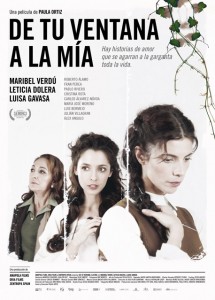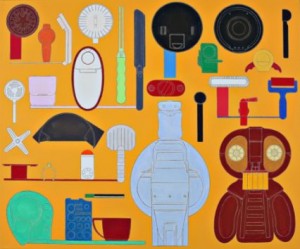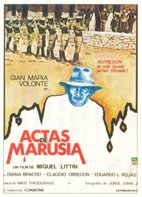Blog del Instituto Cervantes de Dublín
Torre Martello
Culture Night 2013 | Noche de la cultura 2013
 Welcome to Instituto Cervantes at Dublin Culture Night 2013! We have several surprises waiting for all of you who visit our cultural centre during this special cultural night. You cannot miss this great event on September 20th from 6pm to 10pm.
Welcome to Instituto Cervantes at Dublin Culture Night 2013! We have several surprises waiting for all of you who visit our cultural centre during this special cultural night. You cannot miss this great event on September 20th from 6pm to 10pm.
Join us for the art exhibition In a faceless world by renowned Spanish artist Amaya Bozal. There will also be a Latin American handicraft market, an ex-library and second-hand book sale, music andfood to tickle your cultural taste buds.
¡Bienvenidos al Instituto Cervantes de Dublín en la Noche Cultural 2013! Este año tenemos varias sorpresas para celebrar con todos los visitantes esta única y muy especial noche cultural. No te pierdas este fantástico evento el día 20 desde las 18:00 de la tarde hasta las 22:00 de la noche.
Desde las 6 de la tarde, ven a visitar nuestraexposición de pinturas En un mundo sin rostro, de la reconocida artista española Amaya Bozal. En nuestro Café Literario podrás disfrutar de una feria de artesanía latinoamericana y música, además de premiar a tu paladar con degustación de comida típica española y latina.
También podrás llevarte alguna buena lectura en laventa de libros organizada en nuestra biblioteca.
Exhibition: In a faceless world. Paintings and sculptures by Amaya Bozal | Exposición: En un mundo sin rostro. Pinturas y esculturas de Amaya Bozal
Next Thursday, we open the exhibition In a faceless world with the paintings and scultures by Amaya Bozal. You can enjoy 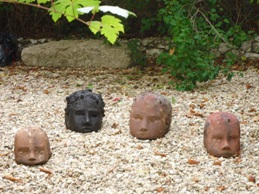
this exhibition until 17th October. The opening hours are Mon-Thu 2-7pm and Sat 10am-2pm.
Through the verses of Samuel Beckett, “what would I do without this world faceless incurious, where to be lasts but an instant”, Amaya Bozal brings to mind thoughts of fragility and violence, the starkness of the passage of time. A world wherefaces don´t belong to real people, they are archetypes, childlike heads painted with earth and gold, moulded in clay like ancient funeral masks, like the remains of an ossuary; fragments of female bodies, earth consumed by fire; wax and clay flowers punctured with old nails. This reflection conveys a depersonalized world, where femininity is only saved by its historic connection with nature.
Amaya Bozal (1972, Madrid) takes something from her classical and archaelogical training, that is reflected in all of her work – a craft she has been developing for over 20 years. She has exhibited in some of the biggest galleries – Sen, Rayuela, Fernández Brasso, Marlborough, Paul Sharpe Contemporary Art – and has participated in ARCO, ArteBA, FIA, and ArtMiami. Her work is visible in the best public and private collections in Europe. Currently, she continues to work in her studio in the mountains near Madrid, using wind, fragments of fallen trees and ancient techniques like fired clay, gold leaf and wax.
El próximo jueves día 12 inauguramos una nueva exposición: En un mundo sin rostro, con las pinturas y esculturas de la artista Amaya Bozal. La exposición permanecerá abierta hasta el 17 de octubre. Las horas de visita son de lunes a jueves de 14: 00 a 19:00 y los sábados de 10:00 a 14:00.
A partir de los versos de Samuel Beckett, “que haría yo sin este mundo sin rostro, sin preguntas, donde ser no dura sino un instante”, Amaya Bozal plantea una reflexión sobre la fragilidad y la violencia, lo descarnado del paso del tiempo. Un mundo donde los rostros no pertenecen a personas concretas, son arquetipos, cabezas infantiles pintadas con tierra y oro, moldeadas en barro como las antiguas máscaras funerarias, como restos de un osario; fragmentos de cuerpos femeninos, tierra devorada por el fuego; flores de cera y barro atravesadas por clavos antiguos. Todauna reflexión sobre un mundo despersonalizado, donde la feminidad sólo se salva en su comunión ancestral con la naturaleza.
Amaya Bozal (1972, Madrid) procede de formación clásica y arqueológica, algo que se trasluce en toda su obra, que viene desarrollando desde hace más de veinte años. Ha expuesto en las mejores galerías, Sen, Rayuela, Fernández Brasso, Marlborough, Paul Sharpe Contemporary Art y ha participado en ARCO, ArteBA, FIA, ArtMiami. Su obra está presente enlas mejores colecciones públicas y privadas de Europa. Actualmente, continúa trabajando en su estudio de la sierra de Madrid, utilizando el viento, fragmentos de árboles caídos y antiguas técnicas como la tierra chamotada, pan de oro o encáustica.
Film screening | Cine: El cielo gira
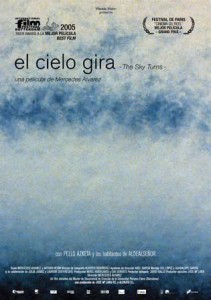 The last session of the film series Feminine Space brings us the poetic film El cielo gira by Mercedes Álvarez. Don’t miss the screening tomorrow at 6pm in Café Literario.
The last session of the film series Feminine Space brings us the poetic film El cielo gira by Mercedes Álvarez. Don’t miss the screening tomorrow at 6pm in Café Literario.
Located in the most depopulated area of Europe, the province of Soria, where more than 75% of the population is over 75 years old, in the village of Aldeaseñor, there are 14 inhabitants; the youngest is 48 years old, the oldest a woman born in 1900. They are the last generation after an uninterrupted history of more than eight centuries. Nothing now can change the ticking away of time in this world which is folding in upon itself. Nowadays life continues.
In a short time it will die out without a sound and without witnesses. For the visitor this landscape of moors and pine woods has been kept strangely intact and virginal without traces of the passing of time. This world forms part of the personal and artistic interests of the 48 year old painter, Pello Azketa who comes to the village along with his wife with the intention of renting a house and spending a short time there.
La última sesión del ciclo de cine Espacio femenino nos trae la poética película El cielo gira de Mercedes Álvarez. No te pierdas la proyección mañana a las 18:00 en el Café Literario.
Situado en la región más despoblada de Europa –la provincia de Soria, donde más del 75% de la población es mayor de 75 años-, en el pueblo de Aldeaseñor quedan hoy 14 habitantes; el menor, de 48 años; la mayor, una anciana que nació en 1900. Son la última generación, después de una historia ininterrumpida de más de ocho siglos. Nada rectificará ya la caída del tiempo en este mundo replegado sobre sí mismo. Hoy, la vida continúa.
Dentro de poco, se extinguirá sin estrépito y sin más testigos. Para el visitante, ese paisaje de páramos y encimares se conserva extrañamente intacto y virginal, sin huellas ni rastro del cambio de los tiempos. Este mundo forma parte de los intereses personales y artísticos de un pintor, Pello Azketa, 48 años, que va a llegar al pueblo acompañado de su mujer, con la intención de alquilar una casa y pasar allí una corta temporada.
Film screening | Cine: De tu ventana a la mía
The new session of Feminine Space, a film series with a particular focus on women, comes today at 6pm to Café Literario. The film is De tu ventana a la mía by Paula Ortiz.
Violet, Inés and Louise are women of different ages, whose days pass in apparent calmness on the other side of the window. Wheatfields, mountains, and the streets of an old city provide settings in which De tu ventana a la mía recreates these women’s lives, as seen through the light and the beauty of memories.
The film gives us the magical past when it was still possible for a young girl to dream in the woods; it gives us, the distant gaze of a mother in the arid desert and the autumnal memory of a mature woman in a closed house. It tells the tale of women who seem to live in silence, but who have memories that keep secrets, passions, and dreams alive.
La nueva sesión del ciclo Espacio femenino, dedicado al papel de la mujer como creadora, llega hoy a las 18:00 al Café Literario con la proyección de la película De tu ventana a la mía de Paula Ortiz.
Violeta, Inés y Luisa son mujeres de edades diferentes, cuyos días transcurren en aparente placidez, al otro lado de la ventana. Los campos de trigo, el refugio en la montaña y las calles de una vieja ciudad, son los lugares donde De tu ventana a la mía recrea sus vidas, sutilmente tamizadas por la luz y la belleza de los recuerdos.
La película se ambienta en ese pasado mágico donde aún era posible el sueño adolescente en los bosques, la mirada lejana de una madre en la aridez del desierto y el recuerdo otoñal de la madurez en la casa encerrada. Mujeres que parecían vivir en silencio, pero cuyos recuerdos guardaban secretos, pasiones, sueños.
Paul Gaffney makes the path by walking | Paul Gaffney hace camino al andar
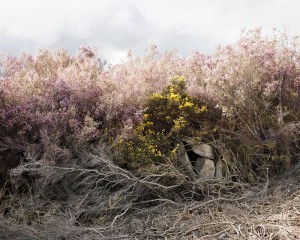 As every year, PhotoIreland and Instituto Cervantes bring you a new exhibition. This time you can enjoy We make the path by walking by artist Paul Gaffney. You can visit the exhibition from July 10th to July 30th. The opening hours are : Mon- Thur 12 am-7pm and Fri 10am-2pm.
As every year, PhotoIreland and Instituto Cervantes bring you a new exhibition. This time you can enjoy We make the path by walking by artist Paul Gaffney. You can visit the exhibition from July 10th to July 30th. The opening hours are : Mon- Thur 12 am-7pm and Fri 10am-2pm.
Over the past year Paul Gaffney has walked over 3,500 kilometres throughout Spain, Portugal and the south of France, with the aim of creating a body of work which explores the idea of walking as a form of meditation. His intention has been to create a series of quiet, meditative images, which would evoke the experience of being immersed in nature and capture the essence of the journey. The images seek to engage the viewer in this walk, and to communicate a sense of the subtle internal and psychological changes which one may undergo while negotiating the landscape.
Paul Gaffney is a Dublin-based artist who has recently completed an MFA in Photography at the University of Ulster in Belfast. His project ‘We Make the Path by Walking’ has been shortlisted for the European Publishers Award for Photography 2013, and also won the Johnsons-Photopia prize at this year’s Format Festival in Derby, England. His work has been exhibited in numerous locations throughout Ireland and the UK, including the Gallery of Photography, Cambridge University, Host Gallery (London) and Third Floor Gallery (Cardiff).
Como todos los años, PhotoIreland y el Instituto Cervantes te traen una nueva exposición. Esta vez puedes disfrutar de Se hace camino al andar del artista Paul Gaffney. La exposición tendrá lugar entre el 10 y el 30 de julio y las horas de visita son lunes a jueves de 12:00 a 19:00 y los viernes de 10:00 a 14:00.
Durante el último año Paul Gaffney ha recorrido más de 3.500 km por España, Portugal y el sur de Francia con el propósito de captar imágenes y momentos que exploren la noción de caminar como vía de meditación. Su intención ha sido crear una serie de imágenes serenas y meditativas que evoquen la experiencia de sentirse inmerso en el entorno y que capturen la esencia del viaje. Las imágenes pretenden hacer partícipe al espectador de este recorrido y reflejar los posibles y sutiles cambios, íntimos y psicológicos, que se viven al atravesar los parajes naturales que le rodean.
Paul Gaffney es un artista afincado en Dublín que ha terminado recientemente un Máster en Bellas Artes en fotografía de la Universidad de Úlster, Belfast. Su proyecto We Make the Path by Walking (Se hace camino al andar) ha sido nominado para el premio EPAP 2013 (European Publishers Award for Photography), y ha sido galardonado con el premio Johnsons-Photopia del Festival Format de Derby, Inglaterra, de este año. Su trabajo se ha expuesto en numerosas localidades de Irlanda y Reino Unido, incluidas la Gallery of Photography, (Universidad de Cambridge), la Host Gallery (Londres) y la Third Floor Gallery (Cardiff).
Film screening | Cine: Siete mesas de billar francés
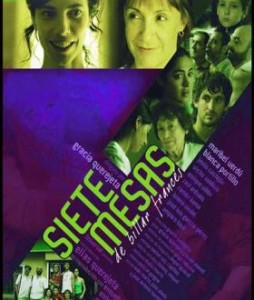
Good cinema today with the screening of Siete mesas de billar francés by Gracia Querejeta. We hope to see you at 6pm in Café Literario. This is part of the Feminine Space cinema series.
Angela and her son Guille travel to the big city to see Leo, her father and the boy’s grandfather, when he suddenly takes ill. However, they arrive to discover that he has just passed away. Charo, the dead man’s mistress, explains the dire straits suffered by the paternal business: a hall with seven billiard tables. Charo is convinced that the only way to pay off the debts is to sell the place. However, Angela learns that her husband has disappeared in mysterious circumstances. Given this painful reality, Angela resolves to get on and rebuild her life. And the first thing she decides to do is put her savings into getting the old place and its seven tables back up on its feet.
Buen cine hoy con la proyección de Siete mesas de billar francés de Gracia Querejeta. Esperamos verte a las 18:00 en el Café Literario. La película es parte del ciclo Espacio femenino.
Ángela y su hijo Guille viajan a la gran ciudad ante la repentina enfermedad de Leo, padre de ella y abuelo del chaval. Cuando llegan, Leo acaba de morir. Es Charo, amante del difunto, la que pone a Ángela al corriente de la ruina del negocio paterno: un local en el que se alinean siete mesas de billar francés. Para Charo, la única solución ante la deuda es vender. Poco después, Ángela tiene noticia de que su marido ha desaparecido en oscuras circunstancias. A partir de esta dolorosa realidad, Ángela se empeña en salir adelante y reconstruir su vida. Y lo primero que decide es emplear sus ahorros en volver a poner en marcha el viejo local de las siete mesas.
Youth Theatre Workshop-ages 12 and up | Teatro para adolescentes- a partir de 12 años
 Summer is the perfect moment to improve your children’s Spanish while they also have fun. We offer you a week theatre workshop running next week from Monday to Friday from 10am to 1pm. The workshop will be conducted in Spanish by Sandra Villegas, Director of The Latin Sphere Theatre.
Summer is the perfect moment to improve your children’s Spanish while they also have fun. We offer you a week theatre workshop running next week from Monday to Friday from 10am to 1pm. The workshop will be conducted in Spanish by Sandra Villegas, Director of The Latin Sphere Theatre.
As a communication tool for adolescents, theatre is an interesting starting point for personal and social development. The objective of the workshop is to help young people to recognise their own capacity for creativity. Verbal and body language excercises, relaxation and role playing are all activities that will help to develop the imagination. Through the performance of plays and the technique of improvisation, an environment of listening and reflection will be created, where everyone can express their opinions freely and explore their dreams.
Sandra Villegas completed post-graduate studies at UCD, where she gained her Masters in Directing for Theatre. She also received a diploma in drama and theatre from NUI Maynooth, and holds a degree in theatre, drama, acting and directing from CUNY (City University of New York). Sandra has trained on Broadway in New York, founded The Latin Sphere Theatre company in Dublin and has facilitated numerous theatre workshops for organisations like LASC (Latin American Solidarity Centre) and Banúlacht.
The price is €160 and you can enrol in our office or from your own home by clicking on the link: https://clicdublin.cervantes.es/en/004-ep-c-02-e3
El verano es el momento ideal para mejorar el español de tus hijos mientras se divierten. La próxima semana te ofrecemos un taller de teatro de lunes a viernes de 10:00 a 13:00. El taller es en español y estará impartido por Sandra Villegas, Directora de The Latin Sphere Theatre.
El teatro como herramienta de comunicación entre los adolescentes es un punto de partida interesante para su desarrollo tanto personal como social. El taller tiene como objetivo hacer al individuo reconocer su propia capacidad creativa. El entrenamiento verbal y corporal, la relajación, y el juego teatral se trabajarán constantemente para incentivar el desarrollo de la imaginación. A través de piezas teatrales y la técnica de improvisación se creará un espacio de escucha y reflexión en dónde cada uno pueda expresar su opinión libremente y poner en práctica deseos y sueños.
Sandra Villegas completó su posgrado en UCD obteniendo una maestría en dirección de teatro. También recibió un diploma en drama y teatro de NUI Maynooth, y su licenciatura en teatro, dramaturgia, actuación y dirección de CUNY (City College of NY). Sandra hizo un período de prácticas en el prestigioso Broadway de Nueva York. Sandra fundó la compañía The Latin Sphere Theatre en Dublín y ha facilitado talleres de teatro para organizaciones como LASC y Banúlacht.
El precio del taller es de 160€ y te puedes registrar en nuestras oficinas o desde casa a través del siguiente enlace: https://clicdublin.cervantes.es/en/003-ep-c-02-e3
Seminar and tasting: Rias Baixas | Seminario y cata de vino: Rias Baixas
ONLY A FEW SPACES LEFT!!!
Have you heard about the delicious wines from Rias Baixas? This Thursday at 6.30 pm you have the chance to enjoy a 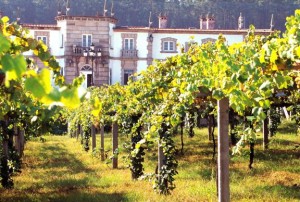 workshop in English where you will learn more about the most renowned wines from Galicia and you will also taste six samples of wines from Rías Baixas. This activity is part of the Celtic Extravaganza: Galicia and El Camino Festival.
workshop in English where you will learn more about the most renowned wines from Galicia and you will also taste six samples of wines from Rías Baixas. This activity is part of the Celtic Extravaganza: Galicia and El Camino Festival.
The fee for this workshop is €15. You can come to our office to register or you can do it on-line if you follow this link:
https://clicdublin.cervantes.es/en/activities
Lisa O’ Doherty is an award winning sommelier with over 10 years experience as chief sommelier at the famous Irish 5 red star resort “The K Club”, home of the 2006 Ryder Cup.
The renowned sommelier Lisa O’Doherty will share her last trip to Rías Baixas and love for this Celtic area in Spain. She will introduce us to one of the most trendy wines in US and its core grape: albariño. 6 Rias Baixas wines will be tasted in this 90 minutes seminar.
The Designation of Origin Rías Baixas (pronounced ree-ahs buy-shuss) is the cool coastal home of the Albariño grape, located in the Celtic region of Galicia and produces some of Spain’s finest white wines.
¡¡¡ÚLTIMAS PLAZAS DISPONIBLES!!!
¿Conoces los deliciosos vinos de las Rias Baixas? Este jueves a las 18:30 tienes la oportunidad de disfrutar de un taller en inglés en el que además de aprender sobre los vinos más reconocidos de Galicia podrás también saborear seis vinos de Rias Baixas.
La actividad está dentro del festival La experiencia celta: Galicia y el Camino de Santiago.
El precio de la entrada del taller es de €15. Puedes venir a nuestra oficina directamente o matricularte desde casa a través del siguiente enlace:
https://clicdublin.cervantes.es/en/activities
La Denominación de Origen Rias Baixas es la franja costera y fría donde se cultiva la uva Albariño. Se sitúa en la región celta de Galicia y produce algunos de los mejores blancos de España.
La reconocida sommelier Lisa O’Doherty compartirá con el público su último viaje a las Rias Baixas y su amor por esta región celta de España. Dará a conocer uno de los vinos más de moda en EEUU y su cepa principal: Albariño. En este seminario de 60 minutos de duración se degustarán 6 vinos de Rias Baixas.
Lisa O’Doherty ha recibido numerosos premios durante sus 10 años de experiencia como sommelier jefe del famoso complejo turístico irlándés de 5 estrellas, The K Club, sede de la Ryder Cup 2006.
Discussion | Charla: The Camino Experience
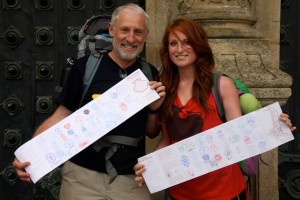 The Celtic Extravanganza: Galicia and El Camino Festival brings us a new event today at 6.30pm in Café Literario. It’s a very special talk about the experience of doing the Camino de Santiago. If you haven´t done it yet, you can get inspired by this talk and start to organize your own trip!
The Celtic Extravanganza: Galicia and El Camino Festival brings us a new event today at 6.30pm in Café Literario. It’s a very special talk about the experience of doing the Camino de Santiago. If you haven´t done it yet, you can get inspired by this talk and start to organize your own trip!
Irish Times journalist Peter Murtagh and his then 18-year-old daughter Natasha walked the Camino Santiago de Compostela from the Pyrenees to Finesterre and wrote a book together, Buen Camino! It tells the story of the people they met along the way and their feelings for each other.
Illustrated talk of 45 minutes with live Galician music by singer Susana Garrido.
El festival La experiencia celta: Galicia y el Camino de Santiago continúa hoy con un nuevo evento a las 18:30 en el Café Literario. Se trata de una charla muy especial sobre la experiencia de recorrer el Camino de Santiago. Si todavía no lo has hecho, puedes inspirarte por esta charla y ¡empezar a organizar tu propio viaje!
El periodista del Irish Times Peter Murtagh y su hija Natasha, que entonces tenía 18 años, recorrieron el Camino de Santiago desde Los Pirineos hasta Finisterre y juntos escribieron el libro Buen Camino!, que narra las historias de las personas que conocieron en el camino y las lazos de amistad que se crearon.
Charla ilustrada de 45 minutos de duración, seguida de música gallega en vivo por la cantante Susana Garrido.
Exhibition | Exposición: José Guadalupe Posada. 100 years
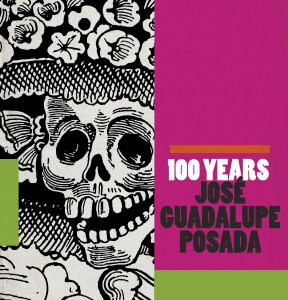 We invite you to enjoy today the official opening of a new exhibition organized by the Embassy of Mexico in Ireland: José Guadalupe Posada. 100 years. The event will be today at 7pm in the Exhibition Room. You can enjoy this fantastic work until July 4th.
We invite you to enjoy today the official opening of a new exhibition organized by the Embassy of Mexico in Ireland: José Guadalupe Posada. 100 years. The event will be today at 7pm in the Exhibition Room. You can enjoy this fantastic work until July 4th.
José Guadalupe Posada (1852-1913) is one of Mexico’s maximum exponents in universal plastic. His work has positioned itself in the collective imagination as synonymous with Mexican culture. It is just enough to mention one of his masterworks, the Calavera Catrina, as the benchmark of the ancestral celebration of the Day of the Dead, recognized and admired internationally.
A hundred years after the death of Posada, the exhibition covers the last decade of the Nineteenth Century and the first of the Twentieth, a period in which Posada consolidated what history set out as theorigin of Mexican popular graphic, and influenced decisively in various forms of art that resulted in the so-called nationalist movement, just after the Mexican Revolution.
This exhibition features over one hundred original pieces grouped into three themes: Daily Life, Disasters and Calaveras. The exhibition, presented in Dublin by the Embassy of Mexico in Ireland and the Cervantes Institute in collaboration with the Government of Aguascalientes, has been integrated by the Mexican National Institute of Fine Arts (INBA), the National Council for Culture and the Arts (CONACULTA), the Cultural Institute of Aguascalientes, México (ICA) and the José Guadalupe Posada Museum.
Opening hours: Mon-Thu: 3-7pm, Sat: 10am-2pm
Hoy estás invitado a asistir a la inauguración oficial de nuestra nueva exposición: José Guadalupe Posada. Cien años, organizada por la Embajada de México en Irlanda. Te esperamos hoy a las 19:00 en la Sala de Exposiciones. Tendrás la oportunidad de disfrutar de este fantástico trabajo hasta el 4 de julio.
José Guadalupe Posada (Aguascalientes, México, 1852 – Ciudad de México, 1913) en su época fue un modesto artesano ilustrador de impresos. Con el paso de los años su aportación resultó tan significativa que actualmente es el artista que mayor influencia tiene en la mayoría de los grabadores mexicanos del siglo XX. La vigencia de su obra continúa hasta nuestros días en el arte popular y seguramente su legado permanecerá por muchos años como ejemplo para artistas y diseñadores gráficos. Buena parte de sus creaciones se han convertido en iconos de la cultura mexicana. A nivel internacional cualquiera de sus estampas representa orgullosamente la identidad del pueblo mexicano.
Horario: Lunes a jueves de 15:00-19:00, Sabado: 10:00-14:00
Workshop: Creative Saturdays. Handcraft workshop for children aged 10-12 | Taller: Sábados creativos. Manualidades para niños de 10 a 12 años
We always keep in mind our younger audience and this Saturday we bring you a handcraft workshop in Spanish for children aged 10-12. The workshop will start at 12:15 and will finish at 1.30pm.
The workshop is designed for children to enjoy creating original and decorative objects or gifts using materials you can find at home (plastic bottles, tetra bricks, cereal boxes,…).
The different crafts will be adapted to each child skills. In the 10-12 years group children will create a wallet, bracelets, gift cards and a paper-box organizer for their desktop.
Workshop conducted in Spanish by Raquel Hernanz.
Raquel Hernanz holds a degree in sociology and has ample experience as educator, Spanish teacher for children and children’s entertainer. She conducts handcraft and ballon twisting workshops.
The fee is €10 and you can register on line: https://clicdublin.cervantes.es/en/activities
El público más joven también tiene su sitio en nuestra programación y este sábado te traemos un taller de manualidades en español para niños de entre 7 y 9 años. El taller comenzará a las 12:15 y termina a la 13:30.
El taller está diseñado para que usando materiales cotidianos, los niños disfruten creando objetos decorativos y regalos originales.
Las diferentes manualidades se adaptaran a las destrezas de cada niño. En el grupo de 10-12 años los niños crearan tarjetas de regalo, una cajita organizadora para su escritorio, un monedero y pulseras.
Taller impartido en español por Raquel Hernanz.
Raquel Hernanz es licenciada en sociología y tiene una amplia experiencia como educadora, profesora de español para niños y animadora infantil. Asimismo es especialista en manualidades y globoflexia.
El precio del taller es de 10€. Te puedes registrar en línea a través del siguiente enlace: https://clicdublin.cervantes.es/en/activities
Lecture: The Irish Literature in Spain | Conferencia: La literatura irlandesa en España
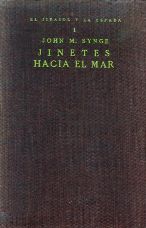 The second talk of the Historical Dialogues series will be held today at 6.30pm in Café Literario. Professor Antonio R. de Toro will be with us to talk about the Irish Literature in Spain.
The second talk of the Historical Dialogues series will be held today at 6.30pm in Café Literario. Professor Antonio R. de Toro will be with us to talk about the Irish Literature in Spain.
The Nobel Prize Juan Ramón Jiménez was very familiar with the writers of the Irish revival. His reading of Yeats is well-documented, and in a hand-written list for the years 1917-1920 he also notes the four major writers of the early years of the century in Ireland: A.E., Yeats, Lady Gregory and Synge. Juan Ramón Jiménez confesses that at the beginning of the century the poets who most profoundly influenced him were Irish. This interest is also reflected in his and his wife Zenobia’s translation of Synge’s Riders to the Sea into Spanish in 1920. After 1916 his translations of poetry included works by A.E. and Yeats, as he admits in a letter to Luis Cernuda.
According to Jiménez, Riders to the Sea left its mark on García Lorca’s Bodas de sangre. And Ian Gibson goes on to state that this play may not had been written had not Lorca read Synge’s play.
Several Irish literary works were translated into Spanish. Apart fom Synge’s play, Alfonso Donado’s translation (pseudonym of Dámaso Alonso) of Joyce’s A Portrait of the Artist as a Young Man, rendered as El artista adolescente and published in Madrid in 1926 and soon afterwards William Butler Yeats.
The authors mentioned above are not the only Irish writers translated into Spanish in book form, but only those, with the exception of Joyce, who were related in some way to the Irish Literary Revival.
Antonio R. de Toro is professor of English Philology at the Universidade da Coruña. He is director of Amergin University Institute of Research in Irish Studies. Vicente Risco (Orense, 1884-1963), influenced by James Joyce’s work, was one of the most influential and complex figures of Galician literature.
La segunda conferencia del ciclo de conferencias Diálogos Históricos será hoy a las 18:30 en el Café Literario. El profesor Antonio R. de Toro estará con nosotros para hablarnos sobre la literatura irlandesa en España.
El Premio Nobel Juan Ramón Jiménez era buen conocedor de los escritores del Renacimiento irlandés. Sus lecturas de Yeats están bien documentadas y en una lista manuscrita que abarca los años 1917-1920 Juan Ramón destaca los cuatro escritores irlandeses más importantes de principios del siglo XX: A.E.: Yeats, Lady Gregory y Synge. Juan Ramón Jiménez llegó a admitir que los poetas de principios del siglo XX que ejercieron una mayor influencia en su obra eran irlandeses. Este interés también se refleja en su versión de la obra Jinetes hacia el mar (Riders to the Sea) que él y su esposa Zenobia tradujeron al español. A partir de 1916 sus traducciones de poesía incluyen obras de A.E y de Yeats, tal y como se lo comunica en una carta a Luis Cernuda.
En opinión de Juan Ramón Jiménez, Jinetes hacia el mar influenció la obra Bodas de Sangre de Federico García Lorca. Ian Gibson ha llegado a afirmar que esta obra no se habría escrito si Lorca no hubiese leído la obra de Synge.
La literatura irlandesa traducida al español es variada. Además de la obra de Synge mencionada, se encuentra la traducción de la obra de Joyce El artista adolescente (A Portrait of the Artist as a Young Man) de Alfonso Donado (seudónimo de Dámaso Alonso) y publicada en 1926 en Madrid. Un poco más adelante se tradujeron obras de William Butler Yeats.
Los autores aquí mencionados no son los únicos escritores irlandeses traducidos y publicados en español, pero son los únicos, a excepción de Joyce, que estaban relacionados en cierta medida con el Renacimiento literario irlandés.
Antonio R. de Toro es catedrático de Filología inglesa de la Universidad de A Coruña y director del Instituto Universitario de Investigación de Estudios Irlandeses “Amergin”.
Film screening | Cine: Pagafantas
If you want to enjoy a good Spanish comedy, just come to the Institute today and enjoy the film Friend Zone. The film is part of the 10 years entertaining through laughter, singing, dancing and… football series. The screening will be on Tuesday at 6pm in Café Literario and Tomás Cimadevilla, producer of the film will be with us for Q&A.
Chema has chucked his long-standing girlfriend because he’s sure he can aspire to something better but for the moment he hasn’t been too lucky in his nighttime skirmishes. So when he meets Claudia he thinks his luck has changed. She’s good fun, really hot and what’s more important she seems to be interested in him. The problem arises when it becomes clear that Claudia does love Chema, she loves him very, very much … but “as a friend”. So Chema has to decide: either not to bother about a girl who he’s got absolutely no chances with or lie in wait and be on the lookout for the first chance he gets to make a pass at her.
Si quieres disfrutar de una buena comedia española, ven esta tarde al Instituto y disfruta de la película Pagafantas. La película es parte del ciclo 10 años haciendo reir, cantar, bailar y… jugar al fútbol. La proyección será el martes a las 18:00 en el Café Literario y Tomás Cimadevilla, productor de la película estará con nosotros presentando la película.
Chema lo ha dejado con su novia de toda la vida porque cree que puede aspirar a algo mejor, pero de momento no está teniendo éxito en sus escaramuzas nocturnas. Por eso, cuando conoce a Claudia, cree que su suerte ha cambiado. Ella es divertida, está cañón, y lo que es más importante, parece muy interesada en él. El problema aparece cuando se hace evidente que Claudia sí que quiere a Chema, le quiere mucho, mucho…pero “como amigo”. En ese momento Chema tendrá que decidir: o pasar de una chica con la que no tiene ninguna posibilidad o esperar agazapado y estar alerta a la primera oportunidad que surja para entrarle a Claudia.
Cine | Film screening: Actas de Marusia
Chile and Mexico join today thanks to the film that we are screening at 6pm at Café Literario. Letters from Marusia is a Mexican film, directed by the Chilean Miguel Littin. The film tells the story of the life and death of the saltpetre Chilean workers of the early 20th century. The film was nominated for an Oscar in 1975 for best foreign film; it also participated in the official competition at Cannes 1976. The film will be presented personally by one of its protagonists, the outstanding and distinguished Mexican artist Diana Bracho.
Diana Bracho has worked with some of the best directors of Cinema in Mexico on over forty films, for instance El Castillo de la Pureza (The Castle of Purity), Las Poquianchis, Entre Pancho Villa y una mujer desnuda (Between Pancho Villa and a Naked Woman), Cuban Blood and Y Tu Mamá También. She has also starred in numerous plays, television series and soap operas, including the famous Cuna de Lobos (Cradle of Wolves).
Iván Trujillo, Director of the prestigious Guadalajara International Film Festival, will also be attending the screening. Both Diana Bracho and Iván Trujillo will participate in a Q & A session after the film.
Refreshments will be served compliment of the Embassy of Mexico and the Embassy of Chile.
Chile y México se unen en la película que te ofrecemos hoy a las 18:00 en el Café Literario. Actas de Marusia es una película mexicana dirigida por el chileno Miguel Littin. El filme narra la historia de la vida y muerte de los trabajadores chilenos del salitre de principios del siglo XX. La cinta estuvo nominada al Óscar en 1975 en la categoría de mejor película extranjera, a la vez que participó en la competición oficial del Festival de Cannes de 1976. La cinta será presentada personalmente por una de sus protagonistas, la destacada y distinguida artista mexicana Diana Bracho.
Diana Bracho ha trabajado con algunos de los directores más sobresalientes del cine mexicano en más de cuarenta filmes, entre ellos El Castillo de la Pureza, Las Poquianchis, Entre Pancho Villa y Una Mujer Desnuda, Cuban Blood y Y Tu Mamá También. Ha protagonizado también numerosas obras de teatro, series de televisión y telenovelas, entre ellas la muy famosa Cuna de lobos.
En la proyección de la película también estará presente el Director del prestigiado Festival Internacional de Cine de Guadalajara, Iván Trujillo. Al final de la cinta habrá una sesión de preguntas y respuestas en la que Diana Bracho e Iván Trujillo responderán a preguntas del público asistente.
Habrá una recepción por cortesía de la Embajada de México y la Embajada de Chile.
Recital literario: Palabras en la calle | Literary recital: Words on the Street
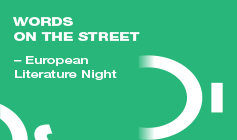 Acércate a descubrir la literatura europea contemporánea a través del trabajo de destacados autores de diferentes países europeos, leídos en inglés por celebridades irlandesas en lugares inusuales alrededor de St. Stephens Green. Paséate de un lugar al siguiente y disfruta de lecturas de 15 minutos de duración, que tendrán lugar cada 30 minutos de 18:30h a 21:00.
Acércate a descubrir la literatura europea contemporánea a través del trabajo de destacados autores de diferentes países europeos, leídos en inglés por celebridades irlandesas en lugares inusuales alrededor de St. Stephens Green. Paséate de un lugar al siguiente y disfruta de lecturas de 15 minutos de duración, que tendrán lugar cada 30 minutos de 18:30h a 21:00.
El Instituto Cervantes te invita a asistir a la lectura, por parte del presentador de TV irlandés Mark Cagney, de un fragmento de la obra La flaqueza del bolchevique (The Faint-Hearted Bolshevik), de Lorenzo Silva, en el edificio histórico Newman House, sede de la primera universidad católica de Irlanda.
Lorenzo Silva (Madrid, 1966) ha escrito, entre otras, las novelas La flaqueza del Bolchevique (finalista del Premio Nadal 1997) que ha sido llevada al cine por Manuel Martín Cuenca, y Carta blanca (Premio Primavera 2004). Ha publicado también libros infantiles y juveniles, además de ensayos. Es especialmente conocido por la serie policiaca protagonizada por los investigadores Bevilacqua y Chamorro. En 2012 le fue concedido el Premio Planeta de Novela a su último trabajo, La Marca del meridiano. Su obra ha sido traducida a numerosos idiomas, como ruso, francés, alemán, italiano y griego. La flaqueza del bolchevique saldrá publicado en inglés en 2013 bajo el título The Faint-Hearted Bolshevik (Hispabooks Publishing).
Try a taste of contemporary European literature as outstanding writers from different European countries are read in English by Irish celebrities in unusual venues around St. Stephens Green. Go from venue to venue and enjoy readings of 15 minute duration which will be held every half hour from 6:30pm to 9:00pm.
Instituto Cervantes invites you to attend the reading of a passage from The Faint-Hearted Bolshevik (La Flaqueza del Bolchevique) by Lorenzo Silva, in voice of Irish TV presenter Mark Cagney, at the historic building of Newman House, home of the first Catholic University inIreland.
Lorenzo Silva (Madrid, Spain, 1966) is author of novels such as La Flaqueza del Bolchevique which was shortlisted for the Nadal Award in 1997, and adapted for the cinema by Manuel Martín Cuenca, and Carta Blanca which won the Primavera Award in 2004. He has also published books for children and young adults, as well as essays. He is specially known for the crime series starring detectives Bevilacqua and Chamorro. In 2012, he was awarded the Spain’s Literary Planeta Prize for his last book, La Marca del meridiano. His books have been translated into numerous languages such as Russian, French, German, Italian and Greek. The English translation of La flaqueza del bolchevique, “The Faint-Hearted Bolshevik”, will be released in 2013 by Hispabooks Publishing.
